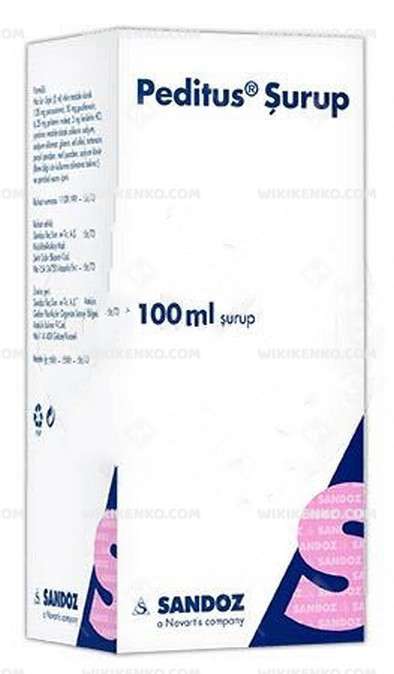Peditus Syrup
Peditus Syrup can be an effective solution for children suffering from upper respiratory tract infections. Its combination of active ingredients provides relief from a range of symptoms, including cough, congestion, and fever. However, it is important to use the syrup responsibly, as overdosing can be dangerous, and long-term use can cause liver damage. If your child experiences any new or worsening symptoms while taking Peditus Syrup, be sure to consult a doctor immediately. With proper medical guidance and care, Peditus Syrup can help your child feel better and get back to their normal routine.
| Potency | 100Ml |
|---|---|
| Manufacturer | |
| Origin | |
| Generic Name (Ingredient) | Each Scale (5 Ml); 120 Mg Paracetamol, 50 Mg Guaifenesin, 6.25 Mg Prilamine Maleate, 5 Mg Phenylephrine Hcl. |
Assuming your emergency circumstances for this product, visit Urgent Quotation page. Besides, for any pharmaceutical questions, please ask us in the comments section.
Description
What is Peditus Syrup?
Peditus Syrup is a cough syrup that is mostly used in upper respiratory tract infections such as cold, cough, fever, and nasal congestion. Its active ingredients include paracetamol, guaifenesin, prilamine maleate, and phenylephrine HCl. These ingredients work together to relieve congestion in the upper respiratory tract, act as an expectorant, and reduce pain and fever.
Benefits
Peditus Syrup has several benefits that make it an effective treatment for upper respiratory tract infections. Firstly, it destroys the effects of histamine, which is the chemical responsible for causing symptoms such as coughing and congestion. Additionally, it acts as an expectorant, which helps to dilute, soften and regenerate bronchial secretions, making it easier for your child to cough them up. Peditus Syrup is also a pain reliever and fever reducer. It can relieve symptoms such as high fever, cough, bronchial irritation, nasal congestion, headache, muscle, and joint pain caused by colds, flu, and other upper respiratory tract infections.
Usage and Dosage
Peditus Syrup is generally prescribed for patients aged 12 and over. Each scoop (5 ml) of syrup contains 120 mg of paracetamol, 50 mg of guaifenesin, 6.25 mg of prilamine maleate, and 5 mg of phenylephrine HCl. It is supplied in a 100 mL glass bottle. When administering Peditus Syrup to your child, be sure to shake the bottle well and measure the correct amount using the syrup beaker. After your child drinks the syrup, you can give fruit juice or milk if you wish. However, keep it out of reach of your child as an overdose can be dangerous. If symptoms do not subside within 3 to 5 days and new symptoms develop, stop using the medicine and see a doctor.
Side Effects
While Peditus Syrup is generally safe, it may have mild side effects such as drowsiness, nausea, vomiting, abdominal pain, and constipation. Long-term use can cause liver damage. Therefore, it should only be used under the supervision of a doctor. If your child experiences any of these side effects, stop using the medicine and seek medical attention.
Conclusion
Peditus Syrup is an effective treatment for upper respiratory tract infections in children. Its active ingredients work together to relieve symptoms such as cough, congestion, pain, and fever. When used correctly, it can help your child feel better and get back to their normal routine. However, be sure to follow the dosage instructions and keep an eye out for any potential side effects. If you have any concerns or questions, consult your doctor.
Use the form below to report an error
Please answer the questions as thoroughly and accurately as possible. Your answers will help us better understand what kind of mistakes happen, why and where they happen, and in the end the purpose is to build a better archive to guide researchers and professionals around the world.
The information on this page is not intended to be a substitute for professional medical advice, diagnosis, or treatment. always seek the advice for your physician or another qualified health provider with any questions you may have regarding a medical condition. Always remember to
- Ask your own doctor for medical advice.
- Names, brands, and dosage may differ between countries.
- When not feeling well, or experiencing side effects always contact your own doctor.
Cyberchondria
The truth is that when we’re sick, or worried about getting sick, the internet won’t help.
According to Wikipedia, cyberchondria is a mental disorder consisting in the desire to independently make a diagnosis based on the symptoms of diseases described on Internet sites.
Why you can't look for symptoms on the Internet
If diagnoses could be made simply from a textbook or an article on a website, we would all be doctors and treat ourselves. Nothing can replace the experience and knowledge of specially trained people. As in any field, in medicine there are unscrupulous specialists, differences of opinion, inaccurate diagnoses and incorrect test results.



Reviews
There are no reviews yet.